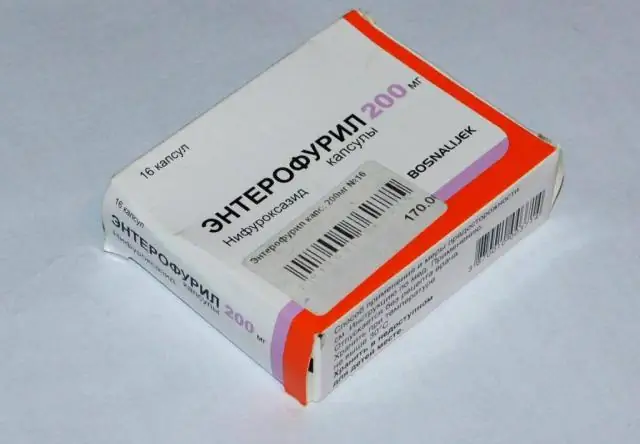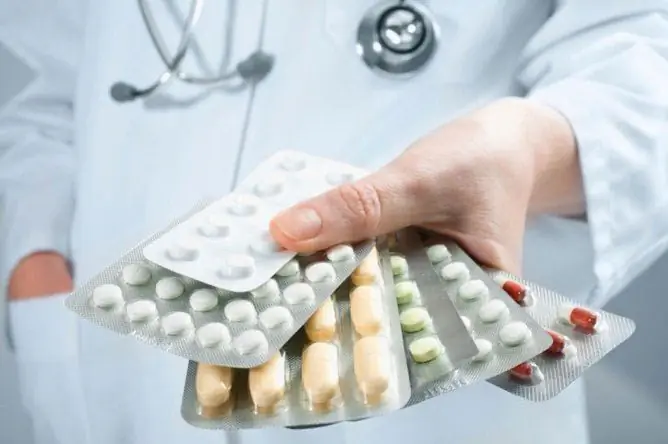- Author Rachel Wainwright wainwright@abchealthonline.com.
- Public 2023-12-15 07:39.
- Last modified 2025-11-02 20:14.
Goldline
Goldline: instructions for use and reviews
- 1. Release form and composition
- 2. Pharmacological properties
- 3. Indications for use
- 4. Contraindications
- 5. Method of application and dosage
- 6. Side effects
- 7. Overdose
- 8. Special instructions
- 9. Application during pregnancy and lactation
- 10. Use in childhood
- 11. In case of impaired renal function
- 12. For violations of liver function
- 13. Use in the elderly
- 14. Drug interactions
- 15. Analogs
- 16. Terms and conditions of storage
- 17. Terms of dispensing from pharmacies
- 18. Reviews
- 19. Price in pharmacies
Latin name: Goldline
ATX code: A08AA10
Active ingredient: sibutramine (sibutramine)
Producer: Izvarino Pharma, LLC (Russia)
Description and photo updated: 2018-26-11
Prices in pharmacies: from 1289 rubles.
Buy

Goldline is a centrally acting drug for the drug treatment of obesity.
Release form and composition
Goldline is available in the form of capsules: size No. 2, hard gelatinous, in a dose of 10 mg - with a yellow body and a blue cap, in a dose of 15 mg - with a white body and a blue cap; inside capsules - powder from almost white to white (10 pcs. in blisters, in a cardboard box of 1, 3, 6, 9 or 12 blisters).
1 capsule contains:
- active substance: sibutramine hydrochloride monohydrate - 10 mg or 15 mg;
- auxiliary components: microcrystalline cellulose, lactose, magnesium stearate, colloidal silicon dioxide;
- composition of the capsule cap: gelatin, brilliant blue dye, sour fuchsin dye (D and C33), sodium lauryl sulfate, titanium dioxide;
- composition of the capsule body: gelatin, sodium lauryl sulfate, titanium dioxide; additionally, in the yellow capsule body - quinoline yellow dye, sunset yellow dye.
Pharmacological properties
Pharmacodynamics
Goldline is a centrally acting drug for the drug treatment of obesity. The active substance, sibutramine, is a prodrug. The mechanism of its action is due to the ability of primary and secondary amines, formed as a result of sibutramine metabolism, to inhibit the reuptake of monoamines (mainly serotonin and norepinephrine). As a result of an increase in the content of neurotransmitters in synapses, central serotonin 5HT receptors and adrenergic receptors are activated, causing an increase in the feeling of satiety. This helps to reduce the need for food and increase thermal production. By indirectly activating beta 3 -adrenergic receptors, sibutramine has an effect on brown adipose tissue.
A decrease in body weight is accompanied by an increase in the level of high-density lipoprotein (HDL) concentration in blood serum and a decrease in the amount of triglycerides, uric acid, low-density lipoprotein (LDL), and total cholesterol.
The action of sibutramine and its metabolites does not affect the release of monoamines and does not inhibit monoamine oxidase (MAO). They do not possess an affinity for serotonin (5HT 1 -, 5HT 1A -, 5HT 1B -, 5HT 2A -, 5HT 2C -), adrenergic (beta 1 -, beta 2 -, beta 3 -, alpha 1 -, alpha 2 -), dopamine (D 1 - and D 2 -), H 1 -histamine, muscarinic, benzodiazepine receptors, ionotropic glutamate receptors that selectively bind N-methyl-D-aspartate (NMDA receptors), and other neurotransmitter receptors.
Pharmacokinetics
After taking Goldline inside, at least 77% of sibutramine is rapidly absorbed from the gastrointestinal tract (GIT). During the first passage through the liver, it is metabolized under the influence of the cytochrome P450 3A4 isoenzyme with the formation of mono- and didesmethylsibutramine, which are active metabolites.
After taking Goldline 15 mg, the maximum concentration (C max) of sibutramine is reached after 1.2 hours, C max of active metabolites - after 3-4 hours. C max of monodesmethylsibutramine averages 4 ng / ml, didesmethylsibutramine - 6.4 ng / ml. With a simultaneous intake of food, the time to reach C max of metabolites increases by 3 hours, reducing their content by 30%.
Protein binding: sibutramine - 97%, active metabolites - 94%.
The rapid distribution of the drug in the tissues allows the equilibrium concentration of active metabolites in the blood plasma to be established within 4 days after the start of use. The achieved level is 2 times higher than the plasma content after taking the first dose.
T 1/2 (half-life) of sibutramine - 1.1 hours, mono- and didesmethylsibutramine - 14 and 16 hours, respectively.
Mono- and didesmethylsibutramine as a result of hydroxylation and conjugation are converted into inactive metabolites and excreted through the kidneys.
Indications for use
Goldline is indicated for the treatment of alimentary obesity with the following body mass indices (BMI):
- BMI 30 kg and more per 1 m2 of body surface;
- BMI of 27 kg and more per 1 m2 of body surface in patients with type 2 diabetes mellitus or dyslipoproteinemia.
Contraindications
- hypothyroidism and other causes of organic obesity;
- anorexia nervosa, bulimia nervosa;
- uncontrolled arterial hypertension with arterial pressure (BP) above 145/90 mm Hg;
- congenital heart defects, ischemic heart disease (CHD), tachycardia, arrhythmia, decompensated chronic heart failure;
- peripheral arterial occlusive disease;
- transient disorders of cerebral circulation, stroke;
- mental illness;
- generalized tics (Gilles de la Tourette's syndrome);
- concomitant therapy with monoamine oxidase inhibitors (MAO) or administered within 14 days prior to Goldline's appointment;
- the simultaneous use of the following drugs: antidepressants, antipsychotics and other drugs affecting the central nervous system (CNS), drugs containing tryptophan, other centrally acting drugs to reduce body weight;
- severe kidney and / or liver dysfunction;
- thyrotoxicosis;
- benign prostatic hyperplasia;
- angle-closure glaucoma;
- pheochromocytoma;
- identified drug, alcohol or pharmacological dependence;
- period of pregnancy;
- breast-feeding;
- age under 18 and over 65;
- hypersensitivity to the components of the drug.
According to the instructions, Goldline should be used with caution in chronic circulatory failure, controlled arterial hypertension (including history), history of arrhythmias, coronary artery disease (including history), cholelithiasis, mild and moderate impairment of renal and / or liver function, neurological disorders (including mental retardation and seizures, including history), history of motor or verbal tics.
Instructions for the use of Goldline: method and dosage
The capsules are taken orally, in the morning before or during breakfast, swallowed whole and washed down with a large amount (200 ml) of water.
The dose is determined by a physician experienced in the treatment of obesity, individually, taking into account the patient's tolerance of the drug and its clinical efficacy.
To achieve a therapeutic effect, the use of Goldline must be accompanied by a diet and a set of physical exercises.
Recommended dosage: initial dose - Goldline 10 mg once a day. With poor tolerance, it is possible to reduce the dose to 5 mg. After 28 days of therapy, an increase in the dose to 15 mg is shown in patients who, while taking the initial dose of the drug, did not achieve a decrease in body weight by 5% or more. The duration of treatment should not exceed two years.
If, within 90 days of treatment, body weight has not decreased by 5% or more, or if, after a decrease, the patient's tendency to decrease in body weight ceases and an increase is observed (by 3 kg or more), it is inappropriate to continue using Goldline.
Side effects
- from the side of the central nervous system: often - insomnia; sometimes - anxiety, headache, paresthesia, dizziness; in isolated cases - drowsiness, anxiety, irritability, emotional lability, nervousness, convulsions, depression, acute psychosis;
- on the part of the cardiovascular system: sometimes - an increase in blood pressure, tachycardia, palpitations, symptoms of vasodilation (including skin flushing), exacerbation of hemorrhoids; in isolated cases - Shenlein's purpura - Genokha (hemorrhagic vasculitis);
- from the digestive system: often - loss of appetite, dry mouth, constipation; sometimes - a change in taste, nausea; in isolated cases - a paradoxical increase in appetite, thirst, abdominal pain;
- dermatological reactions: sometimes - increased sweating; in isolated cases - itchy skin;
- others: in isolated cases - flu-like syndrome, dysmenorrhea, edema, back pain, rhinitis, acute interstitial nephritis, thrombocytopenia, bleeding, transient increase in the activity of liver enzymes in the blood.
Overdose
Symptoms: characteristic signs are not established. The most common side effects, such as increased blood pressure, tachycardia, headache, or dizziness, are possible.
Treatment: there is no specific antidote. If you suspect an overdose of Goldline, you should immediately flush the stomach or induce vomiting, take activated charcoal. Seek medical attention immediately. Provide the patient with free breathing, control of the state of the cardiovascular system. The appointment of supportive symptomatic therapy is shown, if necessary, the use of beta-blockers in patients with high blood pressure or tachycardia. The effectiveness of the appointment of forced diuresis or hemodialysis is not known.
special instructions
The appointment of Goldline is indicated for patients in whom non-drug measures to reduce body weight were ineffective, weight loss within 3 months did not exceed 5 kg.
The use of capsules should be under the supervision of a physician as part of a comprehensive therapy for weight loss, including lifestyle changes, diet and increased physical activity. An important component of therapy is changing the usual lifestyle and diet. Compliance with all the doctor's recommendations during treatment will allow patients to get used to a new lifestyle, which will be the key to maintaining the achieved result in reducing body weight after Goldline is canceled.
During the first month of therapy, side effects may develop, which are reversible and gradually weakened. During this period, clinically significant changes in blood pressure and heart rate are possible. Increased appetite or headache are rare.
There is no information that withdrawal syndrome, withdrawal symptoms or mood disturbances in patients occur after Goldline's withdrawal.
Blood pressure and heart rate (HR) should be monitored, they should be measured 2 times a month during the first two months of treatment, then monthly. If repeated blood pressure measurements indicate a level of 145/90 mm Hg, the capsule intake should be suspended.
It is recommended to exercise caution in patients simultaneously taking drugs that increase the QT interval. These include: astemizole, terfenadine, amiodarone, flecainide, mexiletine, quinidine, propafenone, sotalol (antiarrhythmic drugs), pimozide, cisapride, sertindole, tricyclic antidepressants. In addition, it should be borne in mind that hypomagnesemia or hypokalemia can cause an increase in the QT interval.
When conducting regular medical examinations, the doctor should be especially careful about symptoms such as chest pain, progressive dyspnea, edema in the legs, which are characteristic of the development of primary pulmonary hypertension.
If you skip the next dose of Goldline, the next capsule should be taken as prescribed, without doubling the dose.
Drinking alcohol during the treatment period is absolutely not combined with dietary measures.
Influence on the ability to drive vehicles and complex mechanisms
The use of Goldline can have a negative impact on the patient's ability to drive vehicles and complex mechanisms.
Application during pregnancy and lactation
The use of Goldline is contraindicated during gestation and during breastfeeding.
Women of childbearing age are advised to use reliable contraception during drug treatment.
Pediatric use
Sibutramine is contraindicated in patients under the age of 18.
With impaired renal function
The appointment of Goldline is contraindicated in case of severe renal dysfunction.
Capsules should be used with caution in case of mild to moderate renal dysfunction.
For violations of liver function
The appointment of Goldline is contraindicated in case of severe liver dysfunction.
The drug should be used with caution in case of mild and moderate liver dysfunction.
Use in the elderly
Goldline is contraindicated in patients over the age of 65.
Drug interactions
With the simultaneous use of Goldline:
- ketoconazole, erythromycin, cyclosporine (inhibitors of the isoenzyme CYP3A4) and other inhibitors of microsomal oxidation: increase the concentration of sibutramine metabolites in plasma, increasing heart rate and QT interval;
- antibiotics from the macrolide group, rifampicin, phenobarbital, dexamethasone, phenytoin, carbamazepine: it is possible to accelerate the metabolism of sibutramine;
- selective serotonin reuptake inhibitors (drugs for the treatment of depression), dihydroergotamine, sumatriptan (drugs for the treatment of migraines), pentazocine, pethidine, fentanyl (opioid analgesics), dextromethorphan (antitussive): in rare cases, it is possible to develop serotonin syndrome;
- drugs that increase serotonin levels in the blood: serious consequences of interaction with sibutramine are possible;
- phenylpropanolamine, ephedrine, pseudoephedrine (including combined drugs for the treatment of colds, which include these substances): increase the risk of increased heart rate and blood pressure;
- oral contraceptives: do not interfere with their contraceptive activity;
- ethanol: no increase in the negative effect of ethanol was noted.
Analogs
Analogs of Goldline are: Goldline Plus, Slimia, Lindaxa, Meridia, Reduxin, Fepranon, Goldline Light.
Terms and conditions of storage
Keep out of the reach of children.
Store at temperatures up to 25 ° C, protected from moisture.
Shelf life is 2 years.
Terms of dispensing from pharmacies
Dispensed by prescription.
Reviews about Goldline
Reviews about Goldline are controversial. Doctors note that the drug should be taken solely as directed by a doctor, who must inform the patient that taking capsules has an effect on weight loss with an integrated approach to the problem of obesity. Given the list of contraindications and side effects of sibutramine, it is recommended to carefully assess the ratio of benefits and possible harm from therapy in advance.
Often there are reviews that report tangible results after a month of therapy. However, there are those where patients report rapid weight gain after Goldline withdrawal.
Price for Goldline in pharmacies
The price of Goldline 10 mg for a pack of 30 capsules can range from 1115 to 1305 rubles, for 90 capsules - from 2144 to 2615 rubles; Goldline 15 mg: 30 capsules - from 1450 to 1740 rubles, 60 capsules - from 1835 to 2485 rubles, 90 capsules - from 3179 to 3720 rubles.
Goldline: prices in online pharmacies
|
Drug name Price Pharmacy |
|
Goldline Plus 10 mg + 158.5 mg capsules 30 pcs. 1289 RUB Buy |
|
Goldline Plus reviews 1289 RUB Buy |
|
Goldline 10 mg capsules 30 pcs. 1349 RUB Buy |
|
Goldline Plus capsules 10mg + 158.5mg 30 pcs. 1430 RUB Buy |
|
Goldline Plus 15 mg + 153.5 mg capsules 30 pcs. 1600 RUB Buy |
|
Goldline Plus reviews 1600 RUB Buy |
|
Goldline Plus 10 mg + 158.5 mg capsules 90 pcs. 2026 RUB Buy |
|
Goldline Plus 10 mg + 158.5 mg capsules 60 pcs. RUB 2117 Buy |
|
Goldline Plus capsules 15mg + 153.5mg 30 pcs. 2211 RUB Buy |
|
Goldline Plus capsules 10mg + 158.5mg 60 pcs. 2341 RUB Buy |
|
Goldline 10 mg capsules 90 pcs. RUB 2731 Buy |
|
Goldline 15 mg capsules 90 pcs. 3440 RUB Buy |
|
Goldline Plus 15 mg + 153.5 mg capsules 60 pcs. 3558 RUB Buy |
|
Goldline Plus reviews 3558 RUB Buy |
|
Goldline Plus capsules 15mg + 153.5mg 60 pcs. 3753 RUB Buy |
|
Goldline Plus 15 mg + 153.5 mg capsules 90 pcs. 3803 RUB Buy |
|
Goldline Plus capsules 15mg + 153.5mg 90 pcs. RUB 5108 Buy |
| See all offers from pharmacies |

Anna Kozlova Medical journalist About the author
Education: Rostov State Medical University, specialty "General Medicine".
Information about the drug is generalized, provided for informational purposes only and does not replace the official instructions. Self-medication is hazardous to health!






